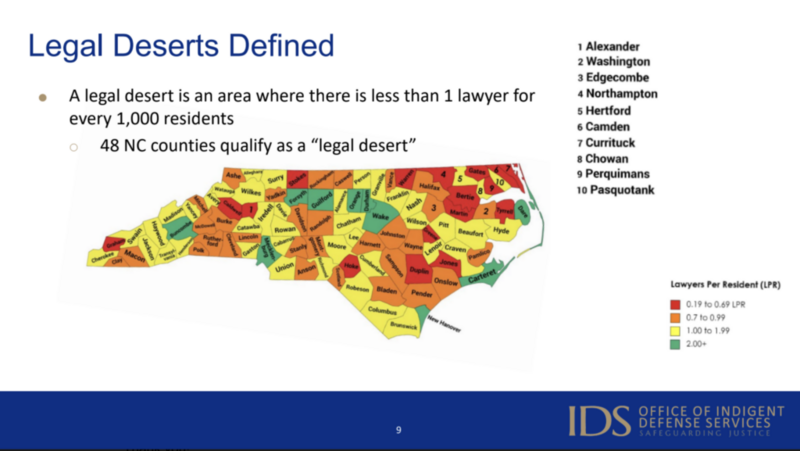Nearly half of North Carolina’s counties are “legal deserts.” State budget proposals could help with that.

Almost half of North Carolina’s counties are “legal deserts,” meaning there is less than one lawyer for every 1,000 residents, the executive director of the North Carolina Office of Indigent Defense Services (IDS) told members of state a commission Thursday morning.
Almost two-thirds of North Carolina’s attorneys are in Wake, Mecklenburg, Guilford, Durham and Forsyth counties, where about one-third of the state’s population lives.
By contrast, there are only 109 practicing attorneys in Harnett County, a growing county where 133,568 people reside.
And while some rural populations may be shrinking, that doesn’t mean they don’t need attorneys, especially lawyers willing to represent the poorest residents of their communities in criminal cases, said IDS chief, Mary Pollard.
Pollard presented the figures to members of the Governor’s Crime Commission. The drying up of North Carolina’s legal services is particularly acute within Pollard’s domain, as privately assigned counsel who take indigent cases are retiring and not being replaced by younger attorneys.
Roughly 40 of the state’s 100 counties have a public defender office. The others rely on court-appointed attorneys, who earn much less from the state than what they could charge as a private lawyer. IDS increased its assigned counsel pay rate last year for the first time since 2011, but that rate is still below what those lawyers were making more than a decade ago.
Pollard said it was hard to get private lawyers to take on court-appointed cases. The money isn’t great — it barely covers the overhead — and is about $50 less per hour than the federal government offers for its cases. Local rural economies can’t sustain a private practice, and taking on court-appointed cases doesn’t pay well enough to earn a living.
Pollard’s pitch: fund public defender offices. She said that would bring quality representation to rural districts and reduce the costs of paying private assigned counsel to take on the cases — savings that could then be reinvested into public defender services. And, she said, lawmakers should lure young lawyers to rural communities by offering some sort of loan forgiveness, an incentive that could make them more willing to move to a small town than a bustling city.
Inadequately funding public defense winds up costing more in the long run, said Pollard. Court dockets become backlogged, jails get more crowded because more people are staying locked up for longer without having been convicted of anything, innocent people feel pressure to plead guilty so they can get on with their lives, which can make it harder for them to get jobs and secure housing.
Part of IDS’s long-term plan is to ensure access to public defenders across North Carolina by the end of the decade. Pollard said that could come in three waves, once per biennium. Each wave would open between eight and 10 public defender offices so that, eventually, people across the state who can’t afford to hire their own lawyer can get an experienced public defender to handle their criminal case.
The House’s budget proposed funding public defenders’ offices in four districts. The Senate’s budget, meanwhile, suggested opening six. Pollard suggested legislators maximize the suggestions between the two budgets, taking two districts from the House budget that weren’t among the Senate’s proposals, so that eight new districts are funded in total.
“We just need more funding,” Pollard said. “We’re just going to keep asking, and the more voices that can join our chorus, the better.”








